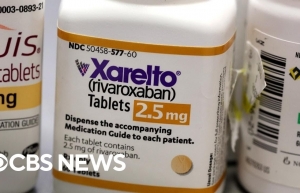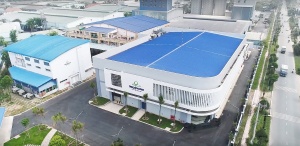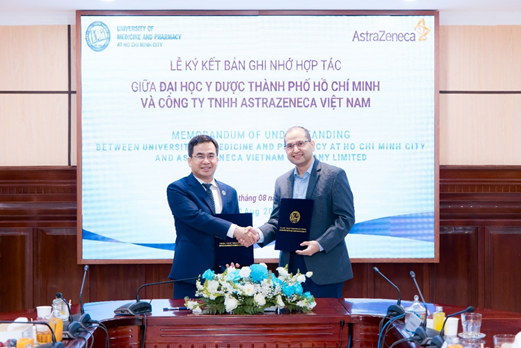Pharma businesses lean towards to open innovation
There are some important and prominent policies in the draft that businesses are interested in, including amending and supplementing Article 7 on state policies on pharmacy and Article 8 on preferential policies and investment support in pharmaceutical industry development. Specific legalised policies will serve as the legal basis for state management agencies and enterprises to implement transparently and conveniently.
 |
| Tran Thi Thu, vice chairman, Vietnam Pharmaceutical Companies Association |
They include incentives and support to develop Vietnam’s pharmaceutical industry into a spearhead industry; and incentive policies for output such as purchasing using the state budget for drugs researched and produced domestically from domestic raw materials; brand name items with technology transfer in Vietnam; the first generic drugs and bioequivalences produced domestically; medicinal herbs and traditional medicines produced from domestic sources; and drugs on the national product list.
Other policies include special support for research activities, technology transfer, investment in the production of pharmaceutical ingredients, new and original branded drugs, specific treatments, applying high technology in production of vaccines, and much more.
Investment incentives are for the production of generic drugs, medicinal ingredients such as excipients and capsule shells, packaging in direct contact with drugs, building biological testing facilities, evaluating bioavailability and bioequivalence, and clinical trial facility.
It is necessary to amend a number of policies that the Law on Pharmacy does not have, or does have but are no longer suitable. These include regulations on simplification of procedures for extension or change of marketing authorisation of drugs and medicinal ingredients; and simplifying a number of other admin procedures related to pharma business activities under the state management of the ministry.
It is expected that the draft amendments will be passed and relevant legal documents guiding the revised law will be issued synchronously, in accordance with relevant laws, and synchronised with the national strategy on developing Vietnam’s pharmaceutical industry and the programme to develop the pharma industry and local medicinal materials towards 2030 and beyond.
They will create a complete system of legal documents on pharmaceuticals, an open legal environment, long-term stability so that businesses have the motivation and peace of mind to build their orientation for investment and development of business activities in the medium and long-term.
They will enable businesses to focus their investments in upgrading or building new factories that meet high technical standards (EU-GMP and equivalent), high-quality human resource training, research and development activities, application of high technology, and much more.
These will help Vietnamese pharmaceutical enterprises improve production and business capacity, meet increasing demands for drugs in terms of both quantity and quality, and improve competitiveness to increase market share of domestically produced items and export value.
By 2030, the country aims that domestic drugs will meet 80 per cent of total demand and 70 per cent of total market value, becoming a high-value pharmaceutical production centre in the region, receiving technology transfer for brand-name drugs, biological products, and vaccines.
By 2045, the country aims to produce specialised or new drugs, original brand-name drugs, vaccines, biological products and medicinal materials; produce original brand-name products using domestic medicinal ingredients which are researched, produced, and copyrighted; while striving to increase the total value of the pharmaceutical industry contributing to national GDP to over $20 billion.
Innovation is the global trend in the digital technology age, and also a trend in the healthcare industry. This trend is being paid attention by Vietnamese pharmaceutical enterprises to develop and apply sci-tech, and offer technical and management solutions to increase productivity, quality, efficiency, and competitiveness.
Main innovation trends among Vietnamese pharmaceutical enterprises include open innovation, such as strengthening links among domestic businesses, and between domestic and foreign businesses to create resources for research and development (R&D), information exchange, and updates of new technology trends, increasing production capacity and competitiveness of businesses.
Capable companies would need to invest in researching drugs that have high economic value such as those which are made from medicinal herbs, biological products, and biosimilars; vaccines, franchised drugs, and tech transfer items; and raw materials for making generic or specialised drugs with small concentrations.
In the upcoming time, they plan to concentrate on investing and applying high technology on digital platforms, as well as AI in management, production, and business activities.
They will continue to invest in building and upgrading high-tech factories to meet EU-GMP technical standards or equivalent; as well as improving product quality, increasing productivity, and reducing product costs.
There is also cooperation with sci-tech establishments, especially institutes, schools, and research centres; forming joint ventures and promoting R&D activities; and taking advantage of domestic medicinal materials, paying attention to innovating technologies for growing, processing, and extracting, and thereby creating drugs with therapeutic effects and high economic value.
 | Vietnam welcomes major Indian pharmaceutical investments Leading Indian pharmaceutical corporations proposed significant investments in Vietnam, including a $5 billion eco-industrial park, underscoring Vietnam's attractiveness as a prime destination for foreign pharmaceutical investments. |
 | MSD Vietnam’s empowering workplace Pharma company MSD Vietnam has been recognised at the HR Asia Awards 2024 for its exceptional human resource policies. |
 | Big Pharma push back on first Medicare drug price cuts Major pharmaceutical companies lashed out following a landmark deal unveiled Thursday to cut the costs of 10 key medicines, with some saying the price-setting process was not transparent. |
 | Imexpharm part of emerging trend of innovation in pharmaceuticals Imexpharm Pharmaceutical JSC (IMP) is investing heavily in high-quality pharmaceutical production technology to meet international standards. |
 | AstraZeneca Vietnam deepens collaboration to enhance education and research AstraZeneca Vietnam is continuing its collaboration with the University of Medicine and Pharmacy of Ho Chi Minh City in medical education and science research capacity enhancement. |
 | Imexpharm’s ambitions to enter global pharma supply chain Imexpharm is driving significant growth by boosting research and development (R&D) into high-tech pharmaceuticals. |
What the stars mean:
★ Poor ★ ★ Promising ★★★ Good ★★★★ Very good ★★★★★ Exceptional
Related Contents
Latest News
More News
- Masan Consumer names new deputy CEO to drive foods and beverages growth (February 23, 2026 | 20:52)
- Myriad risks ahead, but ones Vietnam can confront (February 20, 2026 | 15:02)
- Vietnam making the leap into AI and semiconductors (February 20, 2026 | 09:37)
- Funding must be activated for semiconductor success (February 20, 2026 | 09:20)
- Resilience as new benchmark for smarter infrastructure (February 19, 2026 | 20:35)
- A golden time to shine within ASEAN (February 19, 2026 | 20:22)
- Vietnam’s pivotal year for advancing sustainability (February 19, 2026 | 08:44)
- Strengthening the core role of industry and trade (February 19, 2026 | 08:35)
- Future orientations for healthcare improvements (February 19, 2026 | 08:29)
- Infrastructure orientations suitable for a new chapter (February 19, 2026 | 08:15)

 Tag:
Tag:


















 Mobile Version
Mobile Version